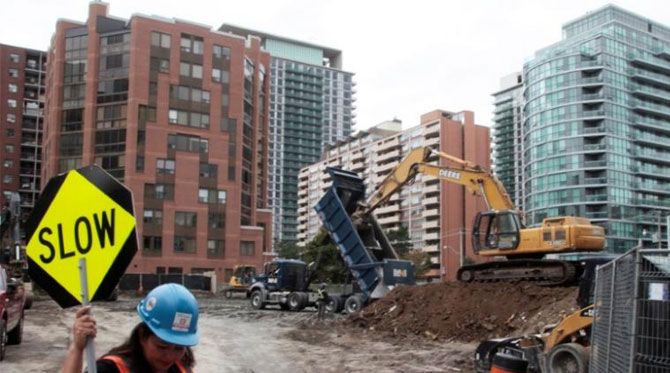Long-term funding was a requirement for infrastructure projects, and asset-liability mismatch in the banking system, impacts the access to finance for infrastructure projects.
One of the key challenges would, however, be to get private sector back into investing.

The BJP’s poll promise to invest Rs 100 trillion in infrastructure appears to be fraught with issues like little private sector appetite and institutional capabilities.
A re-look at contractual frameworks and faster project award, along with availability of land, will be important determinants to make any investment possible.
In five years, it would mean an average annual expenditure of Rs 20 trillion.
According to the NDA government’s last Budget, the government’s capital expenditure on four major infrastructure heads of energy, transport, IT and telecommunication, and urban development is estimated at Rs 2.69 trillion for FY20.
It is not clear how the sizeable increase in investment will be made.
The BJP sees investment being made in sectors including building 60,000 km of national highways, connecting all villages with rural roads, operationalising 100 new airports, modernising 400 railway stations, and covering 50 cities with metro networks.
The next generation infrastructure will include gas grids and water grids, regional airports, and way side amenities along the national highways.
In addition to ensuring efficiency in the economy this will also lead to creation of a large number of jobs.
According to J Padmanabhan, director of Infrastructure Advisory at CRISIL, a continued focus on roads and a lot more emphasis on railways should be the priority of the next government.
Both the railways and aviation sectors will need private investment, while power and urban development also merit attention.
According to a CRISIL estimate, key infrastructure sectors would require an investment of Rs 50-55 trillion during 2018-23.
Quality infrastructure is not just important for economic but also social development, since it helps in integration and modernising the living conditions of citizens.
According to Vishwas Udgirkar, partner at Deloitte, governments over the past two decades have acknowledged the importance of infrastructure such as roads, power, telecom, urban infra, etc.
“This is seen from various initiatives, reforms, and a programmatic approach being taken to expand infrastructure.
"However, we are now at a crossroads, where new challenges have emerged, technological advances and advent of industry 4.0 is changing the ecosystem at an unprecedented pace, and the market is demanding new models for implementing projects in both traditional and emerging infrastructure segments,” he added.
The BJP claimed that physical infrastructure of the country has undergone an unprecedented upgrade in the last five years.
“We have connected 91 per cent of the villages with rural roads, electrified 100 per cent of villages, operationalised 36 new airports and introduced metro networks in several cities,” said its manifesto.
The party recognises the challenge that investment driven growth requires cheaper cost of capital.
It says that the space for structural reduction in the cost of capital has been created by anchoring in inflation at 4 per cent, and cleaning up of the banking system.
“This will not only help infrastructure investment but investment also in the wider economy.
"Thus, new India will be built on the basis of investment driven growth.”
Udgirkar said immediate attention was required for operations and management of assets.
Besides, there is need for alternate sources of financing such as tapping international sources, pension funds, and innovative instruments.
Asset monetisation and recycling of assets to unlock the value of assets created was also needed.
“Contractual flexibilities to address uncertainties over the long duration of infrastructure projects is an important aspect to address,” he added.
Apart from that, building institutions that can tie up various aspects of infrastructure creation, O&M, financing, etc, such as NHAI in the highways sector was required.
One of the key challenges would, however, be to get private sector back into investing.
Padmanabhan says the share of private sector investment in infrastructure has fallen to 25-28 per cent in the last few years, even though it had traditionally been 40-42 per cent.
“High government spending is not sustainable so private sector investment should go at least 35-40 per cent in the medium term,” he says.
Udgirkar says long-term funding was a requirement for infrastructure projects, and asset-liability mismatch in the banking system, impacts the access to finance for infrastructure projects.
Besides, there was lack of an effective apex infrastructure financing institution for addressing financing bottle-necks.
Land was also a big challenge, though the land acquisition process has been improved to a large extent.
Padmanabhan says availability of land in itself was not an issue but the cost of land has gone up.
Padmanabhan says investment in the sector can be improved by stepping up the scale and rigour of project development and creating a bankable pipeline of $ 150 billion projects annually.
A wide range of PPP (public-private partnership) models with recalibrated risk-sharing and balanced contracts should be prepared, which look beyond BOT models to annuity and investment-light models.
Photograph: Chris Helgren/Reuters











